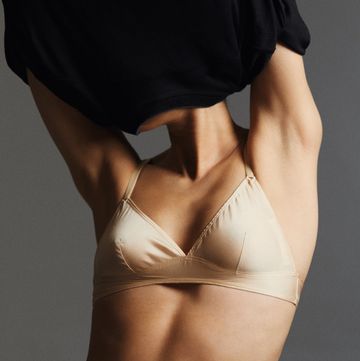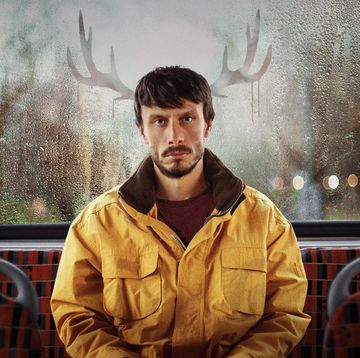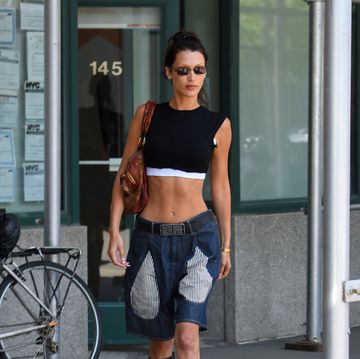In recent years, the world has seemed a place of mounting worst-case scenarios. Any number of things might play on your mind in the middle of the night: the cost of living crisis; war in Europe; nuclear threats; climate emergency; energy shortages; the lingering Covid-19 pandemic; structural racism; a looming recession; or even the fact that British politics is about as consistent as our weather forecasts.
No wonder that, according to a 2022 Reuters Institute Digital News Report, 46% of us in the UK actively avoid the news – up from 22% in 2017. When asked why they wanted to disconnect, the respondents’ most common answers were that they felt powerless or depressed.
It’s a sad picture, but an understandable one. It’s natural to suffer anxiety in the face of grim headlines. A survey by Force of Nature found that 70% of young people feel hopeless about the climate crisis, while half of all tenants are worried they won’t be able to afford their rent this year, according to Market Financial Solutions. There’s no doubt that these problems are serious, but as we go into a new year, are things truly hopeless? Or is it possible that we’ve been too quick to accept that the world is on fire and society is doomed – and that there’s nothing we can do?
The journalist Daisy Greenwell argues our perspective is skewed because we’re not being given the full story.
After many years working for a major newspaper, Greenwell was having her own struggles with maintaining hope. She became more depressed with every headline about politicians ignoring environmental chaos. ‘I had about a year of feeling really bleak, and it coloured all my time with despair,’ she says. ‘It made me think, “There’s no point in working here anymore, because it’s not helping. I only want to do work that’s actually making a difference.”’
Then she came across an online and print magazine called Positive News. ‘I remember the first time I read it – it was extraordinary. It felt like a weight had come off my shoulders.’ Greenwell is now acting editor of the magazine, which is part of a growing international movement known as ‘solutions journalism’ or ‘constructive journalism’. It’s written with the same reporting standards as a mainstream newspaper but has one crucial difference: it focuses on what’s going right in the world.
Recent stories include a new approach to social housing that has significantly reduced homelessness in cities such as Houston and Utah in the US, and Vienna and Helsinki in Europe; a British plumber who’s organised free services to help low-income people stay warm this winter; and groups of Indigenous people who’ve succeeded in protecting huge swathes of land in the Amazon.
Greenwell says she hears of far more good news than she can actually fit into the magazine – and yet the majority of the media simply ignores it. ‘If you suggest a good news story in a traditional newsroom, the response is, “Oh, that’s a bit boring,”’ she says.
Psychologists believe that humans have a negativity bias: we’re drawn to clicking on or reading stories that tell us about potential dangers in the world, because we have an evolutionary need to be aware of threats. Unfortunately, this means that editors are motivated to fill their pages with terrifying stuff. ‘And that doesn’t leave space for shining a light on things that are going right,’ says Greenwell.
The speed with which we consume the news may also be making us feel more panicked than is strictly necessary. In 2005, the Buddhist monk Gelong Thubten entered a retreat on a Scottish island, which meant cutting himself off from phones, internet and news for four years. ‘When I came out of that retreat in 2009 and arrived in London, technology had completely changed,’ he says. ‘The iPhone, YouTube, Twitter and Facebook had all emerged, and it was shocking for me to see how things had sped up. It really surprised me how invasive information had become. Yes, there are very frightening things happening in the world – but do we need to have our stress levels spiked every hour?’
To help us cope with this nerve jangling situation, a number of spiritual and philosophical movements have gathered steam. The self-help industry has pivoted in recent years to the importance of ‘setting boundaries’. It’s a subject that now crops up in conversations about everything from dating to work hours to internet use.
Dr Laurie Santos, a professor of psychology at Yale University, is host of the podcast The Happiness Lab, which shares research on the science of joy. Santos recommends drawing boundaries around news, too: ‘Just because the cycle is 24/7 doesn’t mean we need to consume it 24/7. We can make a decision to shut off notifications and spend only 30 minutes a day taking in the information we need.’ Thubten adds that if we’re going to use sites like Twitter, we can choose to use them in a more constructive way: ‘I think social media can be a powerful platform for spreading love instead of fear.’
The ancient Greco-Roman philosophy of Stoicism has also staged an unexpected comeback thanks to our stressful times, with the @dailystoic Instagram account amassing 1.8 million followers. It’s not a school of thought that will hold your hand during challenging times – instead, roughly speaking, it will encourage you to toughen up. Stoics advise working out what’s in your control and not wasting energy on what isn’t; reminding yourself frequently that we’re all going to die (so that fear of death or loss loses its power); and generally trusting that you can cope with what-ever comes next.
It’s a perspective that has a surprising amount in common with meditation, which has also become hugely popular as an antidote to modern anxiety. In 2018, the Centers for Disease Control and Prevention found that it was the fastest-growing health trend in America. ‘Meditation helps us to look at the thoughts and emotions that are really making us suffer, so that it becomes less about what is happening in the world and more about changing our reactions,’ says Thubten.
He works with major organisations, including the UN, teaching meditation and the benefits of mindfulness. ‘I’m not suggesting we should just block it all out. I’m suggesting we could learn to have more resilience, and more of an ability to stay calm and stay present, even when things around us seem to be falling apart.’
In fact, what wellbeing experts seem to agree on is that if you want to feel hopeful, you need to acknowledge the negative stuff first. ‘Evidence suggests that suppressing our bad emotions just makes them worse,’ says Santos. ‘Hope isn’t about the absence of anxiety or fear. It’s not a Pollyanna view of the world, where you pretend everything is perfect. True hope requires that you address what’s actually happening in the present moment, that you allow in the scary stuff and notice how it makes you feel.’
If you’re struggling with that idea, she recommends a meditation known by the acronym RAIN, popularised by the psychologist Tara Brach. First you ‘Recognise’ what you’re feeling or thinking in the moment; then you ‘Allow’ those feelings to exist without trying to fix them. Next, you ‘Investigate’, by asking yourself more about what you’re experiencing and what you might need; and finally you ‘Nurture’ yourself with a message of love or forgiveness. ‘The research shows that this can be a powerful technique,’ says Santos. Unlike brushing your fear under the carpet, it can leave you with a renewed sense of calm and control.
When you’re feeling particularly low about the news cycle, it’s also worth understanding that terrible events are powerful catalysts and often give rise to incredible progress. World War I gave us female suffrage; World War II gave us the NHS. And now, as a result of the attack on Ukraine, the EU has dramatically sped up plans to end its reliance on Russia’s fossil fuels and invest in sustainable sources. ‘Putin’s war has completely turbo-charged the transition to renewable energy,’ says Greenwell. ‘The most recent International Energy Agency report was quite cheering reading, surprisingly.’
A recent The New York Times article by David Wallace-Wells, the author of The Uninhabitable Earth (it’s as upbeat as it sounds), noted that the predicted warming of the Earth now sits between two and three degrees, down from four or five a few years ago. It’s not good news, but concerted human effort has cut expected warming almost in half in five years. The point is not that things aren’t bad – but that they can change, and it can be the biggest stumbling blocks that lead to the most ambitious changes in direction.
Thubten believes that, closer to home, we can also channel negativity in the world to help us become better and more contented people. ‘It’s OK if things are uncomfortable in life,’ he says. ‘We can be OK with discomfort. With meditation, you get stronger through the obstacles, and you reduce your fear. You become more awake, more alive and more interested in doing good. You’re not able to sort out international problems, but you can definitely do something compassionate in your community – and that makes life more meaningful.’
That’s what moving into constructive journalism has done for Greenwell, who no longer suffers from bouts of despair. ‘On almost every single count – extreme poverty, maternal mortality, child mortality, education of girls, life expectancy – the world is a better place than it was 100 years ago,’ she says. ‘The only thing that is not better is the climate and biodiversity – but even that, in a way, is looking more hopeful than five years ago, when some world leaders were still ignoring it. Every country now has a plan, and that gives me hope.’
Readers of Positive News write to her and share tales of the action the magazine has empowered them to take; one reader set up a therapeutic scheme for Ukrainian orphans being rehomed in her city. ‘Humans are essentially good,’ says Greenwell. There are still plenty of serious problems in the world, of course. But, perhaps, going into 2023, we’re cap-able of solving more than we think.
The Long View
A look ahead to 2023, from how we’ll work to how we’ll love.
MONEY - CASH CANDIDNESS
by Alex Holder, author of Open Up: Why Talking About Money Will Change Your Life
There is a refreshing honesty that comes from a collective crisis. There is so much noise in the news about the cost of living that even if your friends haven’t been hit by rising costs, they’re more likely to understand if you need to dial down expensive socialising or if you’re stressed because your rent has shot up. Don’t be afraid to be cash candid and tell people what you can or can’t afford to do, whether it’s with a date or your sister.
When so much of the macro is out of our control – interest rates, energy bills, transport costs, rent – it’s tempting to surrender all agency and think, ‘F*ck it, there is nothing I can do about it’. But the one thing you can do is stay on top of your own finances. Even if you’re struggling – in fact, especially if you are struggling – it’s important to know exactly what you have coming in and going out. So don’t hide from the reality of your bank account: the more information you have, the more empowered your choices will be.
WORK - THE ENERGY SHIFT
by Sharmadean Reid, founder of The Stack World
What we are predicting is friendship being a trend at work. Young people don’t feel connected to the workplace; they don’t feel that going into the office and meeting their colleagues is a big deal. What I worry about is the future gender leadership gap that’s going to happen from women not networking internally in the workplace.
Our big focus for women for next year is all about how you become the superconnector. How do you build your power network and be the best host? Because the host is always the one with power. How do you get into a position where you can pick up the phone to anybody? I think then women will be less susceptible to workplace trends like quiet quitting and the great resignation because, actually, if you’ve got a crew at work, it’s like being back at school again. I think that there is a huge energy shift in the relationship between women and labour at the moment, and I’m excited for it. It’s going to be a lot less about growth, and more about maintenance.
SEX & RELATIONSHIPS - THE RISE OF LOVER GIRLS
by Laura Pitcher, writer
In times of uncertainty, it’s only natural for us to look to connections with more depth, and prioritise safety and comfort. In friendships, this can look like having a smaller but closer circle. In dating, I know that, for many people, this looks like deleting dating apps and choosing to meet people through mutual friends or shared hobbies. I think mindlessly swiping through a sea of people is becoming tiring, especially for those experiencing high stress in other areas of their lives. And many people are finding in-person encounters more romantic and appealing after lockdowns. Having more options doesn’t mean they are better options, and I think (alongside feeling digitally fatigued in general) people are catching on to the fact that online dating only gives the illusion of choice, and makes commitment harder to come by.
For young women dating men, I think hook-up culture was pitched as this sexually liberating experience that we should all partake in. While it’s true that many people can still be empowered by consensual, respectful and casual agreements, the realities of hook-up culture have left many people feeling disempowered and like their emotional needs aren’t getting met. It’s why we’re seeing the rise of self-confessed “lover girls” and “lover boys” online, longing for romance and deeper connections, and why many opted out of cuffing season entirely this past winter. A lot of people feel hook-up culture has been a scam and – keeping in mind that these “chill” or “casual” interactions still take place under the backdrop of rampant individualism, gender inequalities and social prejudices (like racism) – for many it’s been just that.
GENDER EQUALITY - COMPLACENCY IS NOT AN OPTION
by Zing Tsjeng, author of Forgotten Women
The Supreme Court overturning Roe v Wade could be a harbinger of things to come; as could the appointment of pro-life politician Maria Caulfield in the UK as women’s minister. A concerted conservative pushback against hard-won rights means a lot of people have woken up and realised that we simply can’t take our freedoms for granted; that progress is very fragile and that we can’t relax and settle into complacency.
I predict the UK government will try its best to deflect economic failures by going after culture-war talking points and whipping up hatred against convenient targets: migrants, trans people, left-wing activists or the media. The fundamental problem is that gender equality is suffering because of choices made by the government – its failure to invest in affordable childcare and flexible working laws to support new parents re-entering the workforce, and by slashing public funds that support schools, hospitals and councils. But I’m hopeful that people will see through this.
In terms of reproductive rights, there’s an enormous amount that still needs to be done – but the US midterm election results gave us hope. In the UK, MPs voted for establishing buffer zones around abortion clinics to stop the harassment of patients, and that’s heartening. But the fact remains that abortion in the UK still wrongly remains under the jurisdiction of criminal law, with people struggling to access abortion in Northern Ireland despite it now being ostensibly legal, and anti-abortion groups are ramping up their efforts on UK university campuses. So, as you can see, there’s still a lot that we need to fight.
POLITICS - RETURN TO NORMALITY
by Marie Le Conte, political journalist
It is currently looking as if 2023 might, for the first time since the Brexit referendum, be the year when politics goes broadly back to normal: there’s no huge vote scheduled and, as a result, no foreseeable greater civil war in Westminster. There’s probably not going to be another leadership change either. I think we can assume that the government is not about to fall at any minute, which is surely a good thing.
And with Labour leading in the polls, it will be very interesting to see what the Conservative party decides to do, policy-wise, to try and get those voters back, especially women, the under-45s and people living in cities. I suspect that many will be hoping that finally some change in childcare policy will take place. I think levelling up will also be back on the agenda, even though they might not be calling it that.
This feature originally appeared in the February 2023 issue of ELLE UK.














